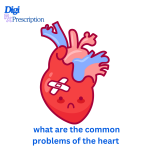
Common Heart Problems: Causes, Symptoms, and Prevention
The heart is one of the most vital organs in the human body, continuously pumping blood to ensure proper circulation. However, various conditions can affect heart health, leading to serious complications if left untreated. Understanding common heart problems can help with early detection, management, and prevention.
1. Coronary Artery Disease (CAD)
Cause: CAD occurs when plaque builds up in the arteries, restricting blood flow to the heart. This can result in chest pain (angina) or heart attacks.
Symptoms:
- Chest pain or discomfort
- Shortness of breath
- Fatigue
- Heart palpitations
Prevention: Maintain a heart-healthy diet, exercise regularly, and manage cholesterol levels.
2. Heart Attack (Myocardial Infarction)
Cause: A heart attack happens when blood flow to the heart is blocked, often due to a clot in a coronary artery.
Symptoms:
- Intense chest pain or pressure
- Pain radiating to the arm, jaw, or back
- Sweating, nausea, dizziness
- Shortness of breath
Prevention: Control blood pressure, quit smoking, and avoid excessive alcohol consumption.
3. Heart Failure
Cause: Heart failure occurs when the heart cannot pump blood efficiently, leading to fluid buildup in the lungs and other parts of the body.
Symptoms:
- Swelling in the legs and ankles
- Persistent coughing or wheezing
- Shortness of breath, even at rest
- Fatigue and weakness
Prevention: Eat a low-sodium diet, stay physically active, and manage chronic conditions like diabetes and hypertension.
4. Arrhythmia (Irregular Heartbeat)
Cause: Arrhythmias occur when the heart beats too fast, too slow, or irregularly due to electrical signal malfunctions.
Symptoms:
- Skipped heartbeats or fluttering sensation
- Dizziness or fainting
- Rapid or slow heartbeat
Prevention: Reduce caffeine and alcohol intake, avoid stress, and get regular heart checkups.
5. Hypertension (High Blood Pressure)
Cause: Hypertension forces the heart to work harder, increasing the risk of heart attack, stroke, and heart failure.
Symptoms:
- Severe cases may cause headaches, vision problems, or nosebleeds
Prevention: Reduce salt intake, maintain a healthy weight, and practice stress management techniques.
6. Valvular Heart Disease
Cause: Heart valves control blood flow through the heart. When damaged by infections, aging, or congenital defects, they may not function properly.
Symptoms:
- Fatigue and dizziness
- Irregular heartbeat
- Swelling in feet or ankles
Prevention: Treat infections promptly, maintain good oral hygiene, and avoid smoking.
7. Congenital Heart Defects
Cause: These are heart structure abnormalities present at birth and can range from mild to severe.
Symptoms:
- Cyanosis (bluish skin)
- Rapid breathing
- Poor weight gain in infants
Prevention: While congenital defects can’t always be prevented, prenatal care and genetic screening can help manage risks.
8. Cardiomyopathy (Enlarged or Weakened Heart Muscle)
Cause: Cardiomyopathy weakens the heart muscle, making it harder to pump blood effectively. It may be genetic or caused by high blood pressure, infections, or excessive alcohol use.
Symptoms:
- Fatigue
- Swollen legs, ankles, or feet
- Shortness of breath
Prevention: Avoid alcohol abuse, manage chronic diseases, and maintain a balanced diet.
Conclusion
Heart diseases are a leading cause of death worldwide, but many can be prevented with lifestyle changes and regular medical checkups. Adopting a heart-healthy lifestyle—such as eating nutritious foods, staying active, managing stress, and avoiding harmful habits—can significantly reduce the risk of heart problems.
References:
- American Heart Association (AHA)
- Mayo Clinic
- National Heart, Lung, and Blood Institute (NHLBI)
